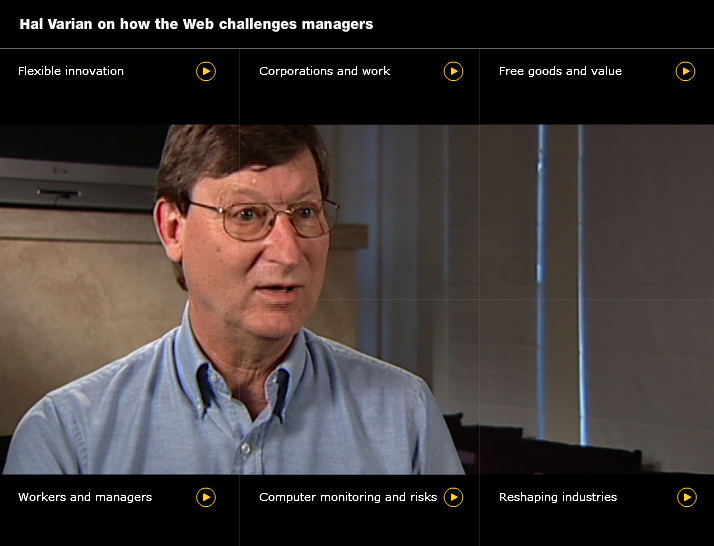Continuing the topic from the last posts on distributed leadership and what’s gotta change, I am now adding Hal Varian to the mix. He got interviewed by the McKinsey Quarterly last year, but the video just got published. Asked on how the Web challenges managers he says that executives in wired organizations need a sharper understanding of how technology empowers innovation. So watch the six-part video – he’s talking about flexible innovation, corporations and work, free goods and value, workers and managers and on reshaping industries (image leads to the McKinsey site, video is not embeddable, somewhat awkward policy):
Two highlighted notes on his underlying theme of knowledge work and the relation to distributed leadership and the role of the CEO – first one about corporations and work:
[…] the kinds of innovations I think will arise on top of that will be innovations in how work is done. […]
If you look at the beginning of the 20th century, we saw the rise of mass production. Henry Ford and the entire team were down on the factory floor raising this, lowering that, speeding up the assembly line, changing the way things were built, and were able to extract far more efficiencies than were available before. I think the same thing is happening now with digital technology. When we’re all networked, we all have access to the same documents, to the same capabilities, to this common infrastructure, and we can improve the way work—intellectual work, knowledge work—flows through the organization. And again, in my opinion, that will lead to a substantial advantage in terms of productivity.
Second one, again about the changed information infrastructure enabling and demanding both close-to the action decision-making and CEOs with a feeling and insight into data:
[…] You also want to be able to visualize the data, communicate the data, and utilize it effectively. But I do think those skills—of being able to access, understand, and communicate the insights you get from data analysis—are going to be extremely important. Managers need to be able to access and understand the data themselves.
You always have this problem of being surrounded by “yes men” and people who want to predigest everything for you. In the old organization, you had to have this whole army of people digesting information to be able to feed it to the decision maker at the top. But that’s not the way it works anymore: the information can be available across the ranks, to everyone in the organization. And what you need to ensure is that people have access to the data they need to make their day-to-day decisions. And this can be done much more easily than it could be done in the past. And it really empowers the knowledge workers to work more effectively.
Funny, the tricky word collaboration never gets mentioned, but we know it structures those fluffy “flows of information and knowledge”.
